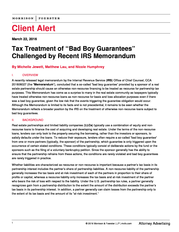Possible Worlds Versus Probable Worlds − the Metaphysics of Systemic Risk: FSOC Revisits Asset Managers – April 26, 2016
Morrison & Foerster
Description
Client Alert
Contact:
Jay G. Baris
(212) 468-8053
jbaris@mofo.com
Oliver I. Ireland
(202) 778-1614
oireland@mofo.com
About Morrison & Foerster:
We are Morrison & Foerster—a global firm of exceptional credentials. Our clients include some of the largest
financial institutions, investment banks, Fortune 100, technology and life science companies.
We’ve been included on The American Lawyer’s A-List for 12 straight years, and Fortune named us one of the “100 Best Companies to Work For.” Our lawyers are committed to achieving innovative and business-minded results for our clients, while preserving the differences that make us stronger. This is MoFo. Visit us at www.mofo.com. Because of the generality of this update, the information provided herein may not be applicable in all situations and should not be acted upon without specific legal advice based on particular situations.
Prior results do not guarantee a similar outcome. 4 © 2016 Morrison & Foerster LLP | mofo.com Attorney Advertising .
We’ve been included on The American Lawyer’s A-List for 12 straight years, and Fortune named us one of the “100 Best Companies to Work For.” Our lawyers are committed to achieving innovative and business-minded results for our clients, while preserving the differences that make us stronger. This is MoFo. Visit us at www.mofo.com. Because of the generality of this update, the information provided herein may not be applicable in all situations and should not be acted upon without specific legal advice based on particular situations.
Prior results do not guarantee a similar outcome. 4 © 2016 Morrison & Foerster LLP | mofo.com Attorney Advertising .
Asset Management Presentations
+
Asset Management Sub Categories














